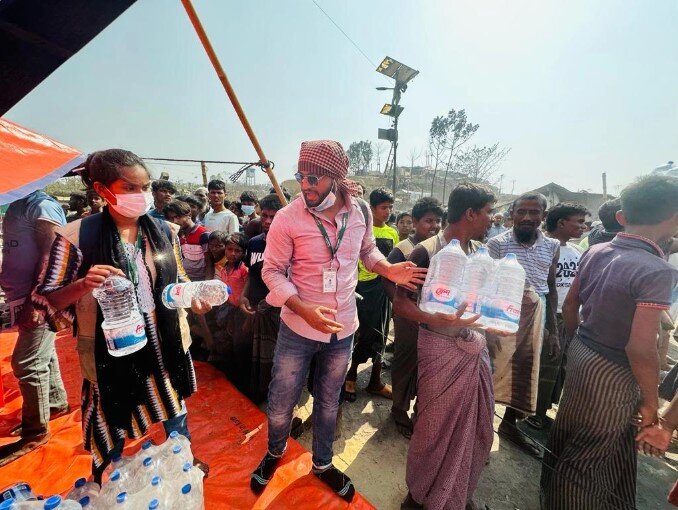By Alexa Duryea | Development Coordinator
Since 2017, the Rohingya population within Myanmar have been fleeing in mass numbers to escape decades of targeted violence and persecution. Many have fled to Bangladesh which now holds one of the largest refugee camps in the world right outside the city of Cox’s Bazar. As 2024 marked the 7th year anniversary of the exodus, the violence in Myanmar has only persevered, over this time more than 1 million people have been forced to take refuge in Cox’s Bazar. In 2024 alone about 14,000 people entered the Cox’s Bazar camp as 60,000 to 70,000 people are stuck waiting at the Bangladeshi border—praying to escape the realities of their home country.
Sadly, arriving at the camp does not mark the end of hardship. Over the past year, both the refugee community and aid organizations like Concern have faced an extraordinary number of challenges. From political unrest and heightened security risks to a rise in climate disasters and the Global Acute Malnutrition (GAM) rate to 15.4%, their resilience has been tested time and again. In May, Cyclone Remal struck Bangladesh, followed by relentless monsoons and flash floods from June to September. Amidst this, violent protests took place between July and August, and as the year drew to a close, a harsh cold wave in December added yet another layer of adversity.
However, the refugee population and Concern’s team braved these challenges with remarkable resiliency. Concern was even able to expand its services and progress in delivering development and humanitarian services in collaboration with local partners. To start, they increased the number of operational Integrated Nutrional Facilities from 11 to 18. These facilities prioritized malnutrition treatment and prevention for children under 5 and pregnant/lactating women. The nutrition-specific interventions were able to reach a total of 69,763 participants, including 56,105 children, 7,918 pregnant women, and 5,740 breastfeeding women. They targeted immediate causes of malnutrition like food intake and childcare practices through healthcare services. The nutrition-sensitive activities reached 41,333 participants, including 15,978 pregnant/lactating women and 3,675 men in support groups. These activities focus on underlying factors of malnutrition that address resource availability and accessibility. More specifically, cash training, home/kitchen gardening, and a graduation program which trains people within the community to become nutrition leaders. In 2024 the graduation program had 6,847 women and 1,567 men complete the training.
In addition to nutrition programs,Concern began to focus on integrating strategic initiatives for climate resilienceand health interventions. As the region grows increasingly vulnerable to the devastating impacts of climate change, it is more critical than ever for humanitarian efforts to go beyond disaster response and integrate sustainable practices into their programs.Considering the lack of infrastructure and overcrowding present in the Cox’s Bazar camp, the Rohingya are one of the most vulnerable populations to the impacts of climate disasters. For this reason, Concern has been working tirelessly to ensure that these goals manifest into actionable steps. We began by seeking out local partnerships to improve our technical climate resilience by assessing vulnerability to natural disasters and nature-based solutions in different regions. We’ve also begun purchasing hybrid vehicles and solar panels for our offices.
In the face of immense adversity, the resilience of the Rohingya community and the dedication of humanitarian organizations like Concern remain unwavering. While challenges persist, significant progress has been made in addressing malnutrition, strengthening community leadership, and integrating climate resilience into aid efforts. The road ahead demands continued commitment, innovation, and collaboration to ensure that sustainable solutions are embedded within humanitarian responses. As the crisis endures, it is imperative that the global community remains engaged, advocating for long-term strategies that not only provide relief but also foster hope, stability, and a path toward a more secure future for the Rohingya people.
Project reports on GlobalGiving are posted directly to globalgiving.org by Project Leaders as they are completed, generally every 3-4 months. To protect the integrity of these documents, GlobalGiving does not alter them; therefore you may find some language or formatting issues.
If you donate to this project or have donated to this project, you can receive an email when this project posts a report. You can also subscribe for reports without donating.
Support this important cause by creating a personalized fundraising page.
Start a Fundraiser